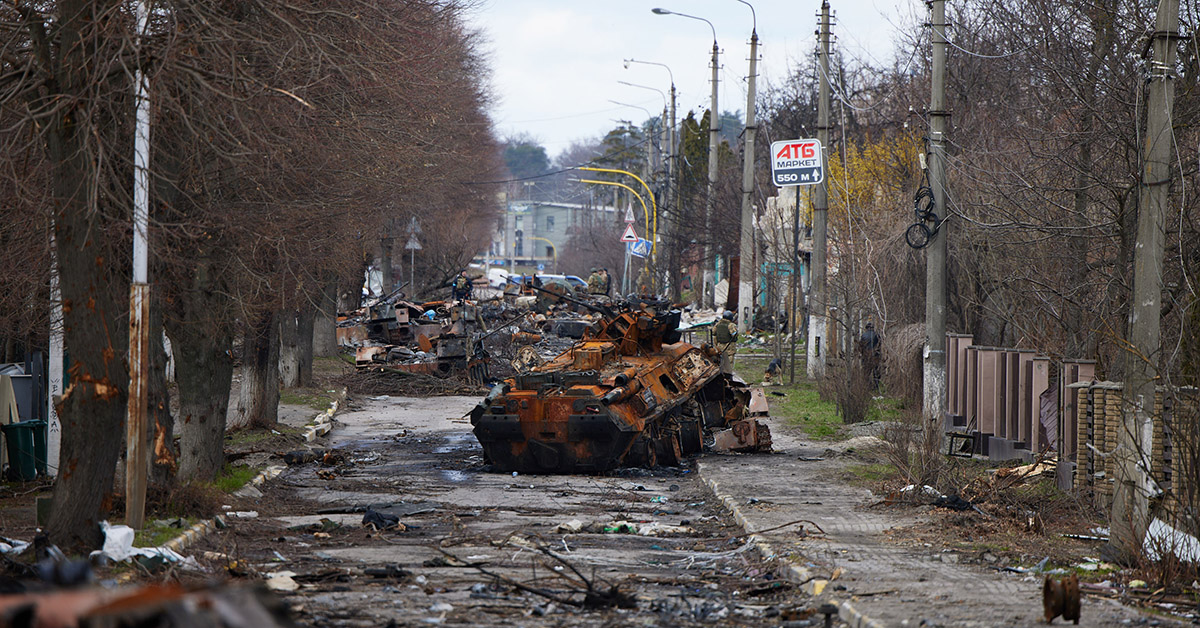

What exactly is the International Rules-Based Order? If you seek a precise definition, or even try to trace its origins, you will struggle. It came to the fore in the 1990s and early 2000s, after the end of the Cold War, in debates about globalisation, international law and how the governments of the world should themselves be governed. The best short definition I have seen is from Professor John Ikenberry of Princeton University (in an interview with the Financial Times’s Gideon Rachman): “It’s a set of commitments by states to operate according to principles, rules and institutions that provide governance that is not simply dictated by who is most powerful.”
The breakup of the Soviet Union in 1990–91, which brought the Cold War to an end, also marked the end of the last great territorial empire. After some four millennia in which empires were often dominant, sovereign national states – many operating within regional associations like the European Union and Organisation of American States, alliances like NATO and informal groupings like the G7 and G20 – now reign supreme. But how are their actions to be regulated, according to whose rules and how should those rules be enforced?
In 1941, during the Second World War, the Atlantic Charter, agreed between Roosevelt and Churchill, agreed a vision for a post-war system of international relations that would secure lasting peace, promote cooperation between nations and ensure that the cataclysm of world war should never occur again. In 1945, after the end of the war, this led to the establishment of the United Nations, whose founding document, the UN Charter, became in effect the rule book for international relations, enshrining the fundamental principles of self-determination, recognition of equality between sovereign nations and commitment to the peaceful settlement of disputes without the threat or use of force.
These principles were not new. Attempts to secure lasting peace and promote cooperation between nations through rules have been a staple of international relations since diplomacy began. The immediate forerunner of the UN, the League of Nations, was established in 1920 as a response to the destruction and slaughter of the First World War. Although well intentioned, it failed through lack of committed resources and active international support. The US Congress refused to endorse it, although the US President Woodrow Wilson, an ardent “liberal internationalist,” had been one of its prime movers. The UN was a more ambitious project and had a more promising genesis. Championed by the US and UK and supported by three other victorious nations – the Soviet Union, France and China (as it then was) and other allies and European countries – it was buttressed by mandates and rules to give it teeth. In due course all the nations of the world signed up, recognising that granting veto rights to the five great powers was a necessary price to get necessary buy-in and effective leadership.
Alongside the central structures (General Assembly, Security Council, Secretariat) were agencies to provide executive capability across the full range of human activity: law (the International Court of Justice), finance (World Bank and IMF), Health (WHO), Trade (WTO) and so on. Despite failures, including destructive regional wars (Korea, Vietnam, Iraq, Middle East, Balkans) the UN can claim to have staved off further global conflict – that could have gone nuclear – during the Cold War. Nearly 80 years later, imperfect though it may be, it survives as the mainstay of global cooperation, peace and stability.
One of the most important early achievements of the UN was the Universal Declaration of Human Rights, adopted by the General Assembly in 1948. Outlining basic rights and freedoms for all mankind, it remains the bedrock for laws on human rights across the world. The Geneva Conventions, extended in 1949, remain another important check on transgressions in time of war. Covering not only the treatment of prisoners of war and civilians, they also apply tests of proportionality, military necessity and humanity (prohibiting torture). During the Cold War there were international agreements limiting the development and use of types of weaponry (especially nuclear) and prohibiting the use of certain weapons altogether (chemical and biological). In addition, the superpowers, recognising their mutual danger, have signed bilateral treaties limiting their arsenals of missiles and nuclear warheads and introduced confidence-building measures to keep open lines of communication in times of crisis and to reduce the risk of accidental conflict.
Together, these measures constitute a formidable edifice of safeguards, and possibly punishment, facing any country and its military contemplating going to war. Or they should. But as we know, breaches are legion, often going unpunished. And it is not always the same bad actors responsible. Disappointingly, perpetrators are to be found on all sides. And that is part of the problem.

In the last two years, two conflicts in particular have highlighted the difficulties of preventing or restraining countries determined to go to war in defiance of the rules: Russia’s war on Ukraine which escalated sharply in February 2022; and Israel’s destructive campaign in Gaza in retaliation for Hamas’s murderous attack on Israel on 7 October 2023.
In both cases there has been widespread condemnation of the levels of violence, disregard for civilian casualties, deliberate targeting of hospitals and other non-military facilities, mistreatment of prisoners and other human-rights violations, denial of humanitarian access and wanton environmental damage. All to not much effect. Despite immediate strong denunciation of Russia’s actions by the UN General Assembly in 2022, Russia has managed to cultivate a small but solid base of support among its neighbours and the Global South, including Belarus, Iran, China, India and North Korea. Western-led sanctions against Russia have hurt, but the war continues. Similarly, although there was initial condemnation of Hamas after its shocking attack, the subsequent brutal and indiscriminate Israeli military response in Gaza has attracted worldwide opprobrium, in particular failing tests of proportionality, necessity and humanity. Criticism of Israel by its closest allies, especially the US and UK, has however been muted, including unwillingness to pressure Israel to agree to a ceasefire. Meanwhile the Israeli Government has shown no willingness to moderate its military operations.
Such equivocation is not new. International responses to alleged breaches of the UN Charter have seldom been based solely on an objective, legalistic or ethical appraisal of the rights and wrongs of the actions taken. They are influenced by traditional alliances, strategic interests, domestic politics, economic advantage and antagonism towards the allies of the country in the dock – for example, in the case of Russia’s actions in Ukraine, suspicion in the Global South of US and NATO motives and good faith, and reluctance to be lectured by Washington.
During the Cold War the Soviet Union regularly used force to bring members of the Warsaw Pact bloc to heel when their pro-Soviet communist governments faced popular opposition and insurrection, claiming that they were invited in to help: East Germany (1953), Hungary (1956), Czechoslovakia (1968) and Poland (indirectly, 1980–81). In 1989 the Soviet Union similarly portrayed its military intervention in Afghanistan as a response to a request for assistance by a friendly, legitimate government deposed in a coup. Other countries, notably the US, NATO members and Pakistan, rejected this justification, accusing the USSR of a flagrant violation of sovereignty motivated by a drive for strategic advantage.
On the other side of the coin, in 1953 the intelligence services of the US and UK orchestrated a coup to depose the Iranian Prime Minister Mohammad Mosaddegh and to restore the monarchy in response to plans to nationalise foreign oil interests in the country and also to counter Soviet and communist influence in the region. Iranian antagonism towards the US and Britain even today can be traced directly back to these events. In 1970, after the leftist leader Salvador Allende came to power in Chile, the US again used covert action to undermine his régime, paving the way for General Pinochet to seize power in a military coup in 1973.
During the Cold War, competition between the Soviet Bloc and the West tended to split the world into two camps on international issues such as these. Since 1991 and the end of the ostensible struggle between capitalism and socialism, the picture has become more complex. Rapid economic growth and globalisation have created new motivations and opportunities for national and regional advantage, beyond ideological allegiances. It is in these more fluid circumstances, no longer carved up into solid blocs, that concern to define and defend the International Rules-Based Order has assumed greater importance. Given its origins, it is unsurprising that the US and other Western countries have led criticism of the actions of rogue states like North Korea, Iran and Syria, and competitors like Russia and China. By themselves, appeals from the West for better behaviour are undermined, however, by a suspicion that, when it suits them, the US and its allies will do whatever they want, claiming exceptions and selective justifications, able to ignore any ensuing outcry, without paying any great penalty. The US-led invasion of Iraq probably did more to weaken the West’s moral authority than any other episode since 1945. The US-led military intervention in Libya in 2011, ostensibly on humanitarian grounds, but resulting in the overthrow of President Gaddafi, served to convince Putin that the West’s aim had been régime change all along and he should not trust them again.
It is not far-fetched to draw a direct line from these episodes to Putin’s mindset in 2014 and then in 2022, when he believed, firstly, he could justify invading Ukraine; and secondly, he would not have to pay a high price for doing so. Countries in the Global South which have refused to take sides against Russia, have taken this position partly out of suspicion of US motives and hostility to US hegemonism, and also (especially in Islamic states) antipathy to Western moral values and irreligiosity. They see Western countries, banging a drum about the International Rules-Based Order, as no better than the rest, just as prone to hypocrisy, putting their own interests first and seeking to obfuscate the issues with grand talk of fundamental principles and rules. Moreover, by not taking sides, they may be rewarded with Russia’s cheap oil and gas and opportunities to sell weaponry to Russia. Donald Trump’s strident espousal of “America First” after he was elected President in 2016 was, for many countries, merely a blunt confirmation of what they assumed had always been the case.
So where does that leave us? The International Rules-Based Order may be flawed, its origins traced to a particularly Western concept of international liberalism. It may be compromised by suspect motives and undermined by breaches on all sides. But the principles embedded in it remain important, even universal. There must be rules. Governments, just like individuals in all societies, need and accept them because they promote a better, safer world. The alternative is international anarchy, a savage free-for-all, threatening the possible destruction of the planet itself, as we often see in terrifying dystopian movies; and at the very least, distracting us from tackling the really urgent global challenges of environmental degradation and global warming.
Breaches of rules that countries have signed up to or should respect should not be cause for despair. They happen. But nor should they be tolerated, ignored and go unpunished. We live in an imperfect world. God’s justice may only be completely found in the next world. We may not expect it in this one, but we should still try. Nor are all transgressions equally reprehensible. We should be able to distinguish between, for example, Russian motives in attacking Ukraine – to conquer territory, change the borders of a sovereign country and remain in charge afterwards – and US motives, however misguided, in invading Iraq: to disarm a rogue state threatening US and regional security, effect régime change and then leave. In Iraq and Afghanistan, the US could claim that civilian casualties caused by military action were regrettable collateral damage. In Ukraine and Gaza, by contrast, civilian casualties often seem to be intentional, designed to terrify and cower the whole population, a deliberate tactic of war.
To quote Professor Ikenberry again, the International Rules-Based Order is work in progress, aspirational rather than an accomplished goal. While it may be in the US and NATO members’ strategic interest to defend Ukraine from Russian aggression and ensure Russia is not victorious, it is not merely self-serving for them to claim that what is also at stake in this conflict is the defence of an international system based on rules and order that is in the interests of the whole world.
So, my conclusion is: let us value and protect what we have, commit ourselves to peaceful cooperation and use the formidable instruments that already exist – incentives and deterrents – many of which have stood the test of time, to deal with the international crises and conflicts we will undoubtedly continue to face. Besides, in current circumstances there is no prospect of being able to develop a new, better system from scratch, not least because those same flaws and conflicts that exist now in international structures would stand in the way of developing a meaningful consensus about what should replace it. Possibly, only a terrible global catastrophe, on a scale similar to the two cataclysmic wars of the last century, would make a root-and-branch restructuring possible. And that would certainly be too high a price to pay.
Michael Shipster, CMG, OBE, is a former British diplomat whose overseas postings included the Soviet Union, India, South Africa and the US.